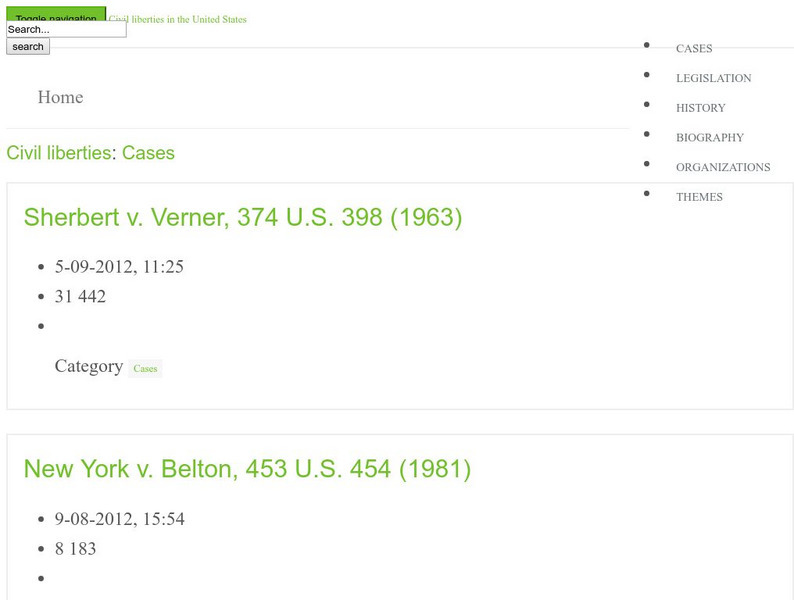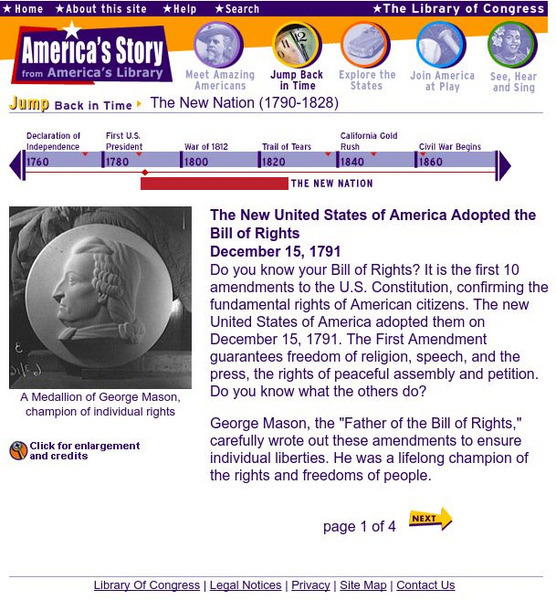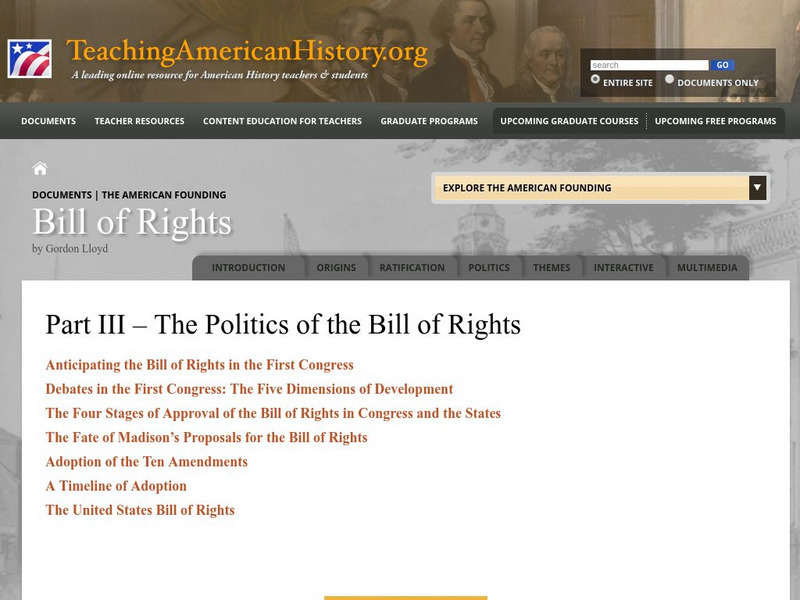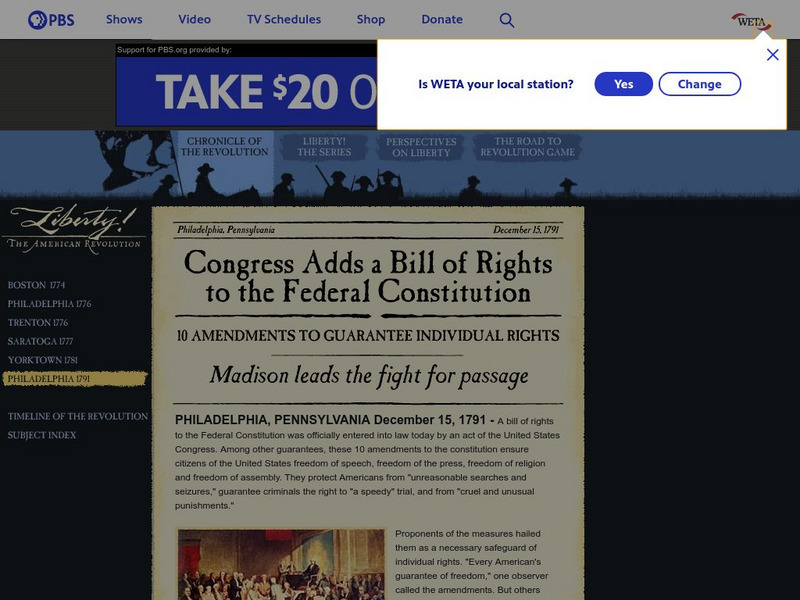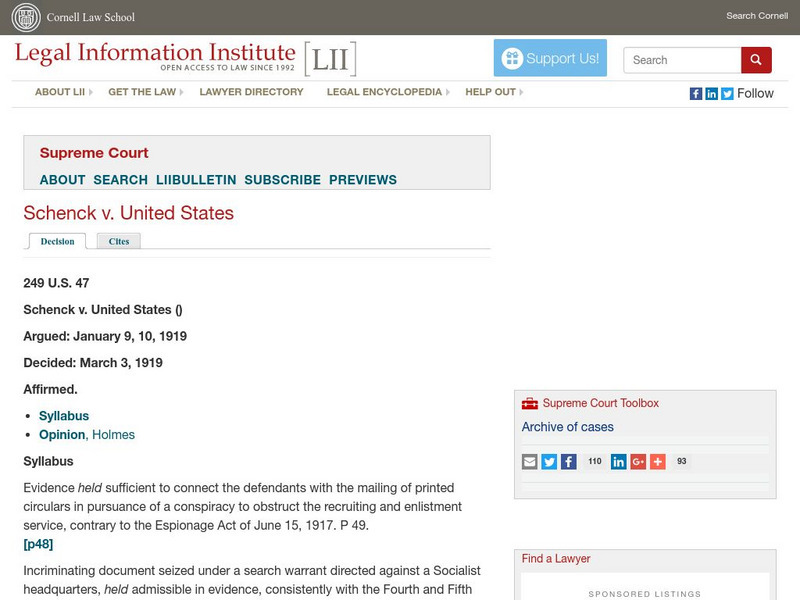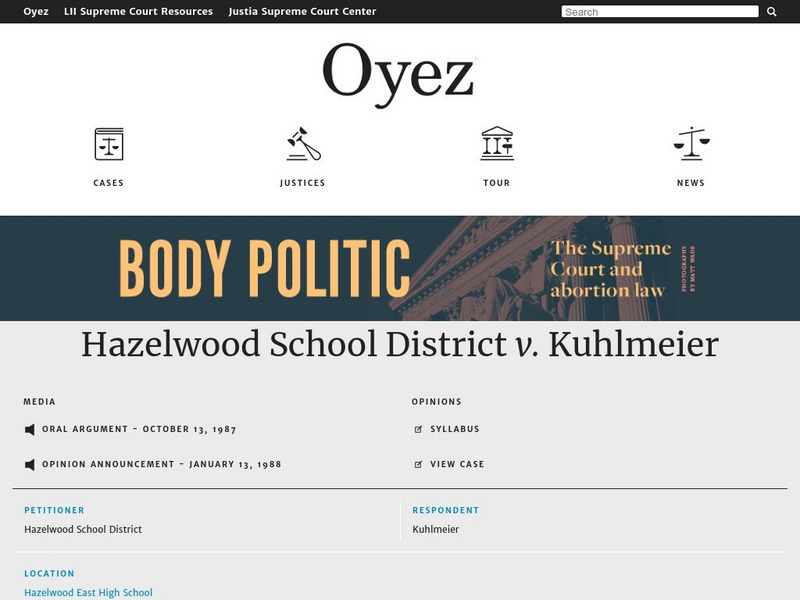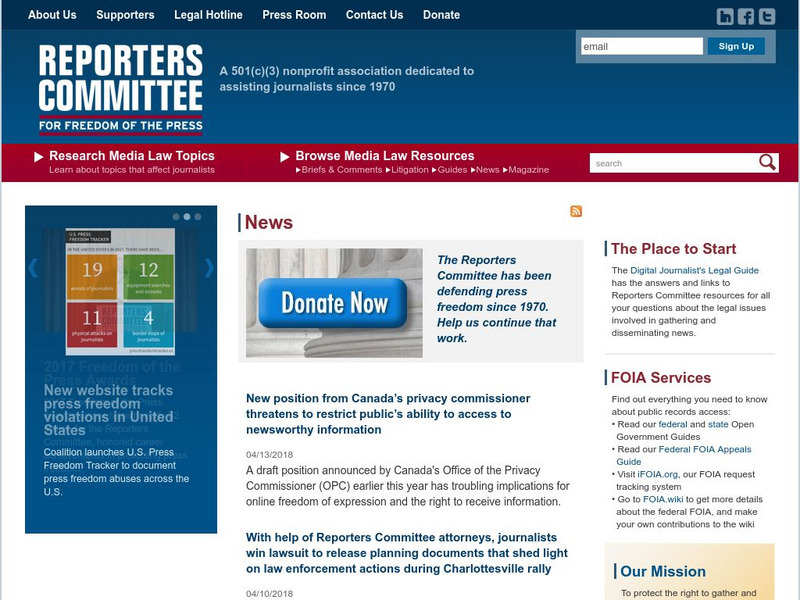Other
Civil Liberties: Lyng v. Northwest Indian Cemetery Protective Association
How does the constitution resolve a conflict between the government's property rights and the right of groups to engage in religious practices on lands they consider sacred? The Supreme Court answered that question in favor of the...
Bill of Rights Institute
Bill of Rights Institute: Texas v. Johnson
This Landmark Supreme Court Cases and the Constitution eLesson focuses on a case involving expressive conduct, and what is for many a deeply cherished symbol of America, the U.S. flag. In a closely divided (5-4) ruling, the Supreme Court...
Other
Streetlaw: Rights in the Community
This website provides several links and introductory information on the Constitution, freedom of speech, freedom of the press, expression in special places, freedom of religion, due process, the right to privacy, discrimination, and...
Annenberg Foundation
Annenberg Learner: Civil Liberties Recap: You Be the Judge
How well can you decide the balance of civil liberties? Review three case summaries as well as the laws and facts about each case and arguments, and then make a ruling.
C-SPAN
C Span Classroom: Social Media and Free Speech
Complete learning module with lesson plan, video, vocabulary and activities on free speech and social media. Students examine arguments through video and text and debate to what extent should social media be protected as free speech...
Illinois Institute of Technology
Oyez.org: Oyez Directory
The OYEZ Directory offers hyperlinks to Supreme Court cases. Choose the topic you'd like to search under, like "Attorneys," or "Civil rights," for example.
Digital History
Digital History: The Bill of Rights
Find a list of the first ten amendments to the Constitution, the Bill of Rights, and see why these additions were made to the ruling document.
Vocabulary.com
The Bill of Rights
This site contains a list of 50 words from the Bill of Rights of the United States Constitution. Teachers can digitally assign this list to their students to reinforce the spellings, pronunciations, and meanings of these words.
Library of Congress
Loc: America's Story: Bill of Rights
The Bill of Rights was adopted to protect each United States citizen's rights. Learn about how the Bill of Rights was formed and the protections it guarantees to Americans.
Other
Our Courts: Bill of Rights: You Mean I've Got Rights? [Pdf]
A great, active lesson about the Bill of Rights. Students compare rights they think they should have with the rights in the actual amendments to the U.S. Constitution. The language of the amendments is broken down into simpler English so...
US Government Publishing Office
U.s. Government Publishing Office: First Through Tenth Amendments: Bill of Rights [Pdf]
A discussion of how the First through Tenth Amendments to the Constitution came to be written.
US National Archives
Nara: Treasures of Congress: The First Congress the Bill of Rights
Visit The National Archives & Records Administration's website on the Bill of Rights. The site gives some background information on the drafting of the Bill of Rights, lets you view the text to the document, lets you view an image of...
Teaching American History
Teaching American History: The Politics of the Bill of Rights: Part Iii
Investigate what the politics were leading to the creation of the Bill of Rights. Identify how the debates in the first congress led to the stages of approval and ultimately the adoption of the ten amendments to the U.S. Constitution.
PBS
Pbs Liberty!: Congress Adds a Bill of Rights
Informative site recounting the events of December 15, 1791, when the Bill of Rights was added to the Constitution. Learn about the Bill of Rights and the freedoms it was designed to protect!
PBS
Pbs News Hour Extra: Supreme Court Considers Free Speech and Protests
Hateful as these actions may seem to many people, do groups still have the right to protest under the First Amendment? Read about the case that the Supreme Court is considering involving protests at a military funeral.
iCivics
I Civics: West Virginia State Board of Education v. Barnette (1943)
This mini-lesson covers the basics of the Supreme Court's decision that it was unconstitutional for a state to force young scholars to salute the flag and recite the Pledge of Allegiance. Students learn how the interests of national...
PBS
Wnet: Thirteen: The Supreme Court: Landmark Cases: Schenck v. u.s. (1919)
PBS offers a summary of the landmark Supreme Court case of Schenck v. U.S. which dealt with when an individual's free speech rights under the First Amendment presented a "clear and present danger." This case has since been overturned.
iCivics
I Civics: Minersville v. Gobitas (1940)
This mini-lesson covers the basics of the Supreme Court's decision that allowed schools to require learners to salute the flag and recite the Pledge of Allegiance. Students learn about the First Amendment and how the interests of...
iCivics
I Civics: Tinker v. Des Moines (1969)
This mini-instructional activity covers the basics of the Supreme Court's decision that extended First Amendment protections to learners in the classroom. Students learn about the concept of symbolic speech and how learners gained the...
iCivics
I Civics: Lyng v. Northwest Indian Cemetery Protective Association (1988)
This mini-lesson examines the Supreme Court case that pitted the interests of government economic projects against the religious rights of American Indians. Students learn about the religious protections of the First Amendment's Free...
Cornell University
Cornell University: Law School: Schenck v. United States (1919)
Features a syllabus of the landmark Supreme Court case of Schenck v. United States which decided that the defendant's right to criticize the draft was not protected by the First Amendment.
Illinois Institute of Technology
Hazelwood School District v. Kuhlmeier (1988)
Resource contains information on the case including how the justices voted, an audio file of the Oral Argument and an abstract of the case regarding high school journalists and their call for First Amendment (free speech) rights.
Reporters Committee for Freedom of the Press
Rcfp: The Reporters Committee for Freedom of the Press
This non-profit organization collects instances of First Amendment and Freedom of Information cases throughout the United States and reports on the facts and outcomes. An interesting cross section from this section of our law.
PBS
Pbs Teachers: Church and State Separation: Challenge and Debate (Lesson Plan)
Describes the elements of the U.S. Constitution's First Amendment as it relates to the separation of church and state and freedom of religion. Speculates on the probable constitutional issues associated with the separation of church and...


